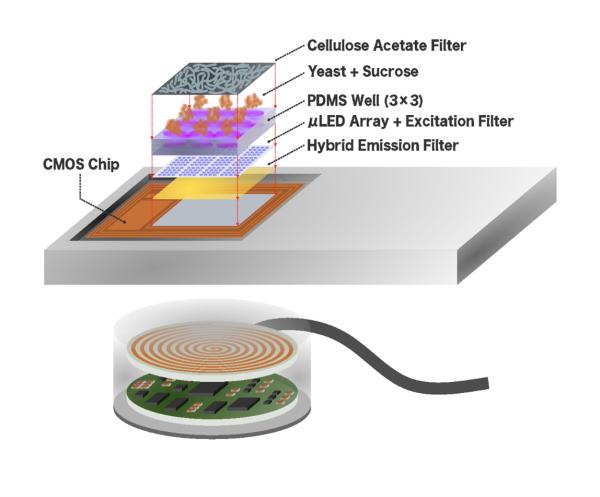
A marketable prototype of the engineered microbial sensor for monitoring PFAS in drinking water, as developed by a team from CCNY and Columbia University
Krish Ramalingam and Alex Rosenthal of the Department of Civil Engineering in The City College of New York’s Grove School of Engineering are co-principal investigators of a team awarded a $2 million National Science Foundation grant to develop a device to detect so-called “forever chemicals” in drinking water.
The three-year project, “NSF Convergence Accelerator Real-World Chemical Sensing Applications: Engineered Microbial Sensors for Monitoring Per- and Polyfluoroalkyl Substances in Drinking Water,” is a cooperative agreement between CCNY and Columbia University that commenced on July 1, 2025.
Per- and polyfluoroalkyl substances, known as PFAS, are a large, complex group of synthetic chemicals that have been used in consumer products around the world since about the 1950s, according to the National Institute of Environmental Health Sciences. These chemicals do not degrade easily in the environment.
This award is to fund Phase II of the project. In Phase I, the initial one-year grant, the team developed the project’s idea and concept, conducted market research to determine the need for such a product, and constructed a marketable prototype. Phase II will involve testing the prototype in the lab before deploying it at sites around the country where an immediate need to obtain PFAS data exists.
Currently, the fastest analysis for PFAS compounds can take up to two months, and can cost between $200 and $400 per sample.
“We intend to cut the time to real time or a few hours, and to reduce the cost to approximately $60,” said Ramalingam. “Also, by using a combination of synthetic biology (with yeast as the base), microprocessor technology, and artificial intelligence, coupled with machine learning techniques, we aim to make this product ubiquitous in the industry. This will be a game changer.”
Virginia W. Cornish, the Helena Rubinstein Professor of Chemistry at Columbia, is the project’s principal investigator.
Launched in 2019, the NSF Convergence Accelerator builds upon basic research and discovery to accelerate solutions toward real-world impact. The program funds teams to solve complex challenges through convergence research and innovation. To enhance its impact, the Accelerator also places teams together in cohorts, synergizing their work through facilitated collaboration.
About The City College of New York
Since 1847, The City College of New York has provided a high-quality and affordable education to generations of New Yorkers in a wide variety of disciplines. CCNY embraces its position at the forefront of social change. It is ranked #1 by the Harvard-based Opportunity Insights out of 369 selective public colleges in the United States on the overall mobility index. This measure reflects both access and outcomes, representing the likelihood that a student at CCNY can move up two or more income quintiles. Education research organization Degree Choices ranks CCNY #1 nationally among universities for economic return on investment. In addition, the Center for World University Rankings places CCNY in the top 1.8% of universities worldwide in terms of academic excellence. Labor analytics firm Lightcast puts at $3.2 billion CCNY’s annual economic impact on the regional economy (5 boroughs and 5 adjacent counties) and quantifies the “for dollar” return on investment to students, taxpayers and society. At City College, more than 15,000 students pursue undergraduate and graduate degrees in eight schools and divisions, driven by significant funded research, creativity and scholarship. In 2023, CCNY launched its most expansive fundraising campaign, ever. The campaign, titled “Doing Remarkable Things Together” seeks to bring the College’s Foundation to more than $1 billion in total assets in support of the College mission. CCNY is as diverse, dynamic and visionary as New York City itself. View CCNY Media Kit.
Syd Steinhardt
212-650-7875
ssteinhardt@ccny.cuny.edu